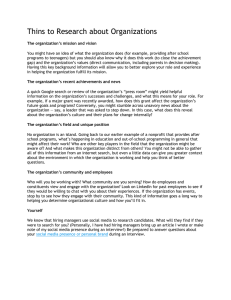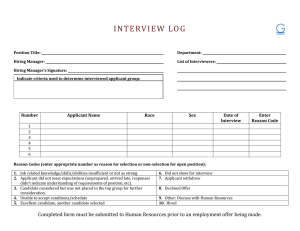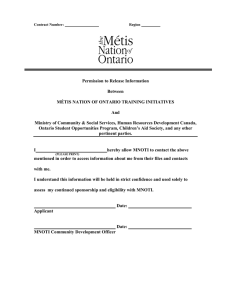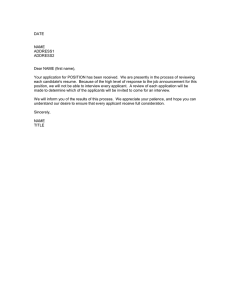Human Rights Code
advertisement
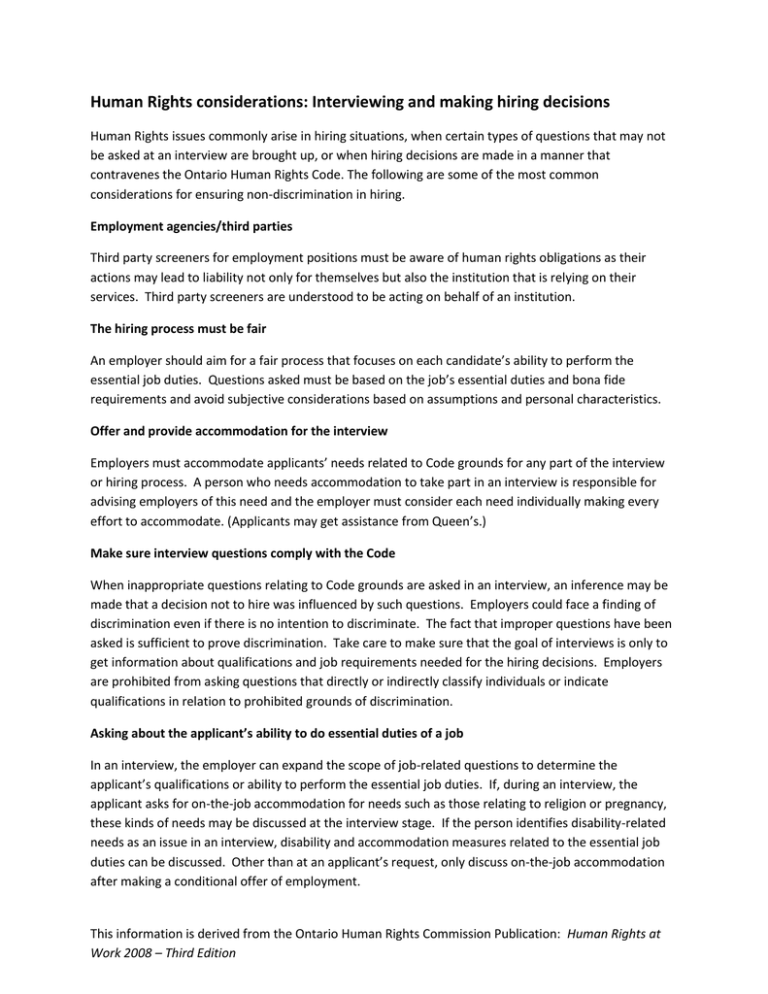
Human Rights considerations: Interviewing and making hiring decisions Human Rights issues commonly arise in hiring situations, when certain types of questions that may not be asked at an interview are brought up, or when hiring decisions are made in a manner that contravenes the Ontario Human Rights Code. The following are some of the most common considerations for ensuring non-discrimination in hiring. Employment agencies/third parties Third party screeners for employment positions must be aware of human rights obligations as their actions may lead to liability not only for themselves but also the institution that is relying on their services. Third party screeners are understood to be acting on behalf of an institution. The hiring process must be fair An employer should aim for a fair process that focuses on each candidate’s ability to perform the essential job duties. Questions asked must be based on the job’s essential duties and bona fide requirements and avoid subjective considerations based on assumptions and personal characteristics. Offer and provide accommodation for the interview Employers must accommodate applicants’ needs related to Code grounds for any part of the interview or hiring process. A person who needs accommodation to take part in an interview is responsible for advising employers of this need and the employer must consider each need individually making every effort to accommodate. (Applicants may get assistance from Queen’s.) Make sure interview questions comply with the Code When inappropriate questions relating to Code grounds are asked in an interview, an inference may be made that a decision not to hire was influenced by such questions. Employers could face a finding of discrimination even if there is no intention to discriminate. The fact that improper questions have been asked is sufficient to prove discrimination. Take care to make sure that the goal of interviews is only to get information about qualifications and job requirements needed for the hiring decisions. Employers are prohibited from asking questions that directly or indirectly classify individuals or indicate qualifications in relation to prohibited grounds of discrimination. Asking about the applicant’s ability to do essential duties of a job In an interview, the employer can expand the scope of job-related questions to determine the applicant’s qualifications or ability to perform the essential job duties. If, during an interview, the applicant asks for on-the-job accommodation for needs such as those relating to religion or pregnancy, these kinds of needs may be discussed at the interview stage. If the person identifies disability-related needs as an issue in an interview, disability and accommodation measures related to the essential job duties can be discussed. Other than at an applicant’s request, only discuss on-the-job accommodation after making a conditional offer of employment. This information is derived from the Ontario Human Rights Commission Publication: Human Rights at Work 2008 – Third Edition Making non-discriminatory hiring decisions Employers must make sure that only information about qualifications and job requirements is considered when making hiring decisions. If an applicant has volunteered information relating to Code grounds during the hiring process, decision-makers should not consider this information. In these cases, employers should be very careful about assessing the candidates based on legitimate factors. Bias or stereotypes in the decision-making process may lead to eliminating candidates on the basis of grounds protected under the Code. The following provides a few examples of hiring decisions that may be tainted by discriminatory considerations: Viewing an applicant as unsuitable because they needed accommodation in the hiring process: when making hiring decisions, employers should not take into account whether a person has requested accommodation during the hiring process. Perceiving that an applicant will be disruptive because they have objected to discriminatory comment or conduct in the interview or because they have requested accommodations: is reprisal for a qualified applicant to be penalized for reacting to discriminatory comment or conduct related to a Code ground in an interview. For example, an employer asks an applicant whether she is single. She says that this is not relevant and asks that the interview focus on her qualifications. As a result, she is viewed as not having “people skills” and is no longer considered for the job. Taking into account discriminatory customer preferences: If an employer believes that customers would object to a person being hired due to their membership in a group protected by the Code, it is not permissible to take this into account in a hiring process. For example, it would be discriminatory for a manager of a small business office serving mostly White clientele to reject a Black candidate because he believes that customers would be uncomfortable being greeted by a racialized receptionist. Assuming that a person is not suitable without fully assessing their qualifications: Persons with disabilities may be affected by “social handicapping” when they are presumed to be unable to do the job, even though their disabilities are not relevant. This may also affect candidates from other protected groups. Rejecting applicants because they do not match the “fit” of the organization’s culture: This could disadvantage persons identified by race and race-related grounds or other people who are easily identified as not belonging to the dominant group. Making decisions based on the perceived ability to obtain a visa or be safe in the country: it is up to the individual to make informed decisions on these matters once they have been given access to all of the information available regarding health and safety issues and legal restrictions within the country in which the organization operates and where the applicant will work. This information is derived from the Ontario Human Rights Commission Publication: Human Rights at Work 2008 – Third Edition We observe and uphold Ontario’s Human Rights Code Our organization respects and follows the letter and spirit of the Ontario Human Rights Code. We support and protect the dignity and worth of everyone. We provide equal rights and opportunities for all employees, clients and volunteers. Our policies, programs and processes are designed to address, prevent and eliminate discrimination in all aspects of employment and when we provide services to others. We do not tolerate harassment or unwelcome comments and actions. We take prompt action if such problems occur. These are the prohibited grounds of discrimination under the Code: race, ancestry, place of origin, ethnic origin, citizenship, sexual orientation, sex, gender identity, gender expression, disability, colour, creed, age (18 and over, 16 and over in housing), marital status, family status, reprisal, receipt of public assistance (in housing), record of offences (in employment) and discrimination because of association. The Code requires equal treatment in employment, housing, contracts, goods, services and facilities, and membership in vocational associations and trade unions. The Ontario Human Rights Commission works to promote, protect and advance human rights. Its main focus is the root causes of discrimination. Through outreach, cooperation, partnership and advocacy, the OHRC aims to advance Ontario’s human rights culture. Contact the OHRC if you want to learn more about human rights education and outreach or human rights issues in Ontario. Website: www.ohrc.on.ca Email: info@ohrc.on.ca Toronto: 416-326-9511 Toll Free: 1-800-387-9080 TTY: 416-326 0603 TTY (Toll Free): 1-800-308-556 The Human Rights Legal Support Centre provides free legal services to people who have been discriminated against under Ontario’s Human Rights Code. Contact the Centre if you have experienced discrimination and need legal advice or help deciding whether you should make a human rights application. Website: www.hrlsc.on.ca Tel: 416-597-4900 Toll Free: 1-866-625-5179 TTY: 416-597-4903 TTY (Toll Free): 1-866 612-8627 The Human Rights Tribunal of Ontario deals with claims of discrimination filed under the Ontario Human Rights Code. The Tribunal resolves applications through mediation or adjudication. The Tribunal's goal is to resolve claims in a fair, open and timely manner. Contact the Tribunal if you want an application guide or information about the status of your case, copies of any Tribunal forms or information about the Tribunal’s procedures. Website: www.hrto.ca Tel: 416-326-1312 Tel (Toll Free): 1-866-598-0322 TTY: 416-326-2027 TTY (Toll Free): 1-866-607-1240 Case-related enquiries should be directed to: The Registrar, Human Rights Tribunal of Ontario 655 Bay Street, 14th floor Toronto, ON M7A 2A3 Phone: 416-326-1519 |Toll-free: 1-866-598-0322 TTY: 416-326-2027 | TTY Toll-free: 1-866-607-1240 Fax: 416-326-2199 | Fax Toll-free: 1-866-355-6099 Email: HRTO.Registrar@ontario.ca
